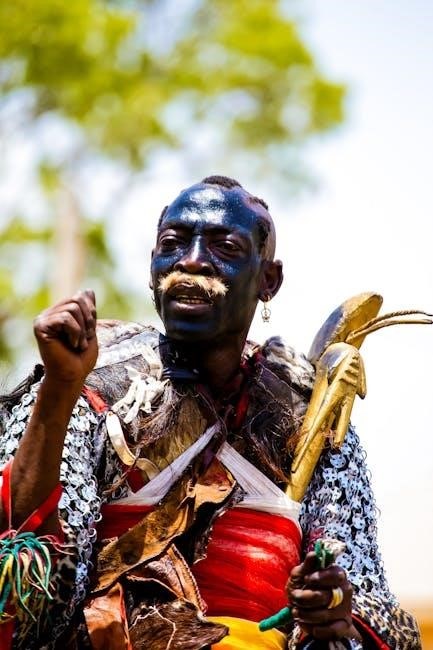The Essentials of Cultural Anthropology: A Toolkit for a Global Age, Third Edition by Kenneth J. Guest is a comprehensive guide to cultural anthropology. Published by W. W. Norton in 2020, it offers essential concepts and tools for engaging with key global issues.
1.1 What is Cultural Anthropology?
Cultural anthropology is the study of human cultures, behaviors, and social structures across the globe. It explores the diversity of human experiences, focusing on cultural practices, beliefs, and material traits. Anthropologists examine how societies adapt to change, negotiate power dynamics, and create meaning. This field is holistic, seeking to understand cultures in their entirety, and comparative, highlighting similarities and differences. It emphasizes long-term ethnographic research to capture the complexity of human life. By studying cultures, anthropologists aim to promote cross-cultural understanding and address global challenges like inequality and globalization.

1.2 The Importance of Cultural Anthropology in Today’s Global Age
Cultural anthropology is vital in today’s interconnected world, offering insights into globalization, cultural exchange, and human adaptation. It equips individuals with tools to navigate diverse societies, fostering empathy and understanding. By studying cultural practices, values, and power dynamics, anthropology helps address global challenges like inequality, migration, and environmental change. It promotes cross-cultural communication, essential for diplomacy, business, and policy-making. In a rapidly changing world, cultural anthropology provides a framework to appreciate human diversity and collaborate effectively across borders, ensuring sustainable and inclusive solutions for global issues.
1.3 Overview of the 3rd Edition of “Essentials of Cultural Anthropology”
The 3rd Edition of Essentials of Cultural Anthropology: A Toolkit for a Global Age by Kenneth J. Guest is a streamlined, accessible guide to cultural anthropology. Published in 2020, it covers core concepts, globalization, and contemporary issues like technology’s impact on culture. The book emphasizes practical applications, helping students engage with global challenges. It includes digital resources and exercises to enhance learning, making it a valuable tool for understanding cultural diversity in today’s interconnected world. This edition reflects the dynamic nature of cultural anthropology, equipping readers to navigate and address global complexities effectively.

Key Concepts in Cultural Anthropology
Cultural anthropology explores culture, ethnocentrism, and cultural relativism, emphasizing globalization’s impact on traditions. Symbols, norms, and values shape societies, as discussed in Kenneth J. Guest’s 3rd Edition toolkit.
2.1 Culture: Definitions and Significance
Culture, as explored in the Essentials of Cultural Anthropology, refers to the shared symbols, norms, and practices that define human societies. It is a learned system of meaning that shapes identity and social order. Culture encompasses language, beliefs, customs, and artifacts, serving as a toolkit for navigating the world. Its significance lies in its ability to adapt and evolve, ensuring survival and cohesion within communities. The 3rd Edition emphasizes culture’s role in addressing global challenges, highlighting its dynamic and enduring influence on human behavior and perception.
2.2 Ethnocentrism and Cultural Relativism
The Essentials of Cultural Anthropology discusses ethnocentrism as the tendency to judge other cultures by one’s own standards, often leading to misunderstanding. Cultural relativism, in contrast, involves understanding cultures on their own terms, fostering empathy and reducing bias. These concepts are crucial in a globalized world, where cross-cultural interactions demand nuanced perspectives. Ethnocentrism can hinder collaboration, while cultural relativism promotes mutual respect and cooperation. The book emphasizes balancing these approaches to navigate cultural differences effectively and address global challenges with sensitivity and awareness.
2.3 Globalization and Its Impact on Cultures
Globalization, as explored in Essentials of Cultural Anthropology, refers to the increasing interconnectedness of the world through economic, cultural, and technological exchanges. While it fosters cultural exchange and economic opportunities, it also risks cultural homogenization. Local traditions may be overshadowed by dominant global trends, leading to a loss of cultural diversity. The book highlights how globalization reshapes identities, creating both opportunities for collaboration and challenges in preserving unique cultural practices. Understanding these dynamics is crucial for navigating an increasingly interconnected world.

Theoretical Frameworks in Cultural Anthropology
Essentials of Cultural Anthropology explores classical theories like functionalism and structuralism, alongside contemporary perspectives such as postcolonialism and feminism, providing a robust foundation for understanding cultural dynamics.
3.1 Classical Theories: Functionalism, Structuralism, and Evolutionism
Classical theories in cultural anthropology, such as functionalism, structuralism, and evolutionism, provide foundational frameworks for understanding societies. Functionalism, developed by Émile Durkheim and Bronisław Malinowski, emphasizes how cultural practices and institutions meet societal needs. Structuralism, inspired by Ferdinand de Saussure and Claude Lévi-Strauss, explores underlying structures of human thought and culture. Evolutionism, rooted in the works of Edward Tylor and Lewis Henry Morgan, traces the developmental stages of cultures. These theories, while influential, have faced critiques for oversimplifying cultural complexity and historical contexts.
3.2 Contemporary Theories: Postcolonialism, Feminism, and Postmodernism
Contemporary theories like postcolonialism, feminism, and postmodernism offer critical perspectives on power, identity, and cultural representation. Postcolonialism examines the legacies of colonialism and challenges Eurocentric narratives. Feminism highlights gender inequalities and advocates for inclusive frameworks. Postmodernism questions grand narratives, emphasizing diversity and fragmented identities. These theories, covered in the Essentials of Cultural Anthropology, Third Edition, provide tools to critique power dynamics and promote nuanced understandings of cultural complexities in a globalized world.
3.3 Applied Anthropology: Using Theory for Practical Solutions
Applied anthropology bridges theory and practice, addressing real-world challenges through ethnographic insights. It employs cultural knowledge to develop solutions for issues like development, healthcare, and education. By engaging with communities, anthropologists design interventions that respect local contexts. This approach, highlighted in the Essentials of Cultural Anthropology, Third Edition, demonstrates anthropology’s relevance in solving practical problems, ensuring sustainable and culturally sensitive outcomes in diverse settings globally.

Methods and Fieldwork in Cultural Anthropology
Cultural anthropology relies on ethnography and participant observation to explore human cultures deeply. These methods, detailed in Kenneth Guest’s work, enable immersive understanding and practical application of anthropological concepts.
4.1 Ethnography: The Core Method of Cultural Anthropology
Ethnography is the cornerstone of cultural anthropology, involving extended fieldwork to deeply understand a culture. It combines observation, interviews, and participation to capture detailed insights into social practices and meanings. Ethnographic research, as highlighted in Kenneth Guest’s work, emphasizes immersion and empathy, allowing anthropologists to explore cultural nuances and power dynamics. This method fosters a holistic understanding of communities, making it invaluable for addressing global challenges and promoting cross-cultural awareness.
4.2 Participant Observation: Immersing in the Culture
Participant observation is a key ethnographic method where anthropologists actively engage in the daily activities of the culture they are studying. By immersing themselves, researchers build trust and gain deeper insights into social dynamics, norms, and practices. This approach, as discussed in Kenneth Guest’s work, allows for nuanced observations and personal experiences, enriching the understanding of cultural contexts. It bridges the gap between outsider perspectives and insider meanings, making it a powerful tool for capturing the complexities of human behavior and cultural systems.
4.3 Data Collection Methods: Interviews, Surveys, and More
Data collection in cultural anthropology involves diverse methods to gather comprehensive insights. Interviews, both structured and unstructured, allow for in-depth exploration of individual perspectives. Surveys provide quantitative data, enabling broad comparisons across populations. Ethnographers also use participant observation, focus groups, and life histories to capture nuanced cultural dynamics. These methods, as outlined in Kenneth Guest’s work, help anthropologists balance depth and breadth, ensuring rich and representative data. By combining these approaches, researchers can uncover both patterns and deviations, fostering a holistic understanding of cultural practices and beliefs.
Globalization and Its Effects on Cultures
Globalization fosters cultural exchange, economic interdependence, and the blending of traditions, yet it challenges local cultures, leading to homogenization and the dominance of global consumer culture practices worldwide.

5.1 The Global Economy and Cultural Exchange
The global economy drives cultural exchange, connecting diverse societies through trade, technology, and media. Multinational corporations spread cultural practices, influencing local traditions and consumer behaviors. This exchange fosters cultural homogenization, as global brands and lifestyles gain prominence, often overshadowing indigenous customs. However, it also enables cross-cultural understanding and hybridization, creating new cultural forms. The interplay between economic globalization and cultural diversity raises questions about identity, power dynamics, and the future of traditional practices in a rapidly interconnected world, as explored in Essentials of Cultural Anthropology.

5.2 The Impact of Media and Technology on Cultural Practices
Media and technology profoundly shape cultural practices, enabling global connectivity and cultural exchange. Social media platforms and streaming services disseminate cultural content worldwide, influencing traditions, languages, and identities. While this fosters cross-cultural understanding, it also risks cultural homogenization. Traditional practices adapt to digital formats, such as virtual rituals and online festivals, reflecting the blending of modernity and heritage. The rise of digital tools challenges and transforms how cultures are preserved, shared, and evolved in an increasingly interconnected world, as discussed in Essentials of Cultural Anthropology.
5.3 Transnational Identities and Diaspora Communities
Transnational identities and diaspora communities are central to understanding global cultural dynamics. Diasporas maintain connections to their homelands while adapting to new societies, creating hybrid identities. These communities navigate cultural preservation and integration, influencing both their host and origin cultures. The third edition of Essentials of Cultural Anthropology highlights how globalization facilitates transnational ties, reshaping notions of belonging and identity. This dual cultural engagement fosters diverse expressions of tradition and modernity, enriching global cultural landscapes while addressing challenges of displacement and multiculturalism.
Diversity and Inequality in Cultural Anthropology
Diversity and inequality are central to cultural anthropology, examining how race, ethnicity, class, and gender shape human experiences and societal structures globally.
6.1 Race, Ethnicity, and Power Dynamics
Race and ethnicity are deeply intertwined with power dynamics, shaping social hierarchies and cultural identities. In Essentials of Cultural Anthropology, 3rd Edition, Kenneth J. Guest explores how race and ethnicity are socially constructed, influencing access to resources and opportunities. The book examines historical and contemporary contexts, such as colonialism and systemic inequality, to illustrate how power imbalances are reinforced. By analyzing case studies, students gain insight into the ways race and ethnicity intersect with other forms of identity, creating complex systems of inclusion and exclusion globally.
6.2 Class and Economic Inequality: A Cultural Perspective
Class and economic inequality are examined through a cultural lens in Essentials of Cultural Anthropology, 3rd Edition. Kenneth J. Guest explores how cultural practices, values, and beliefs shape economic systems and social stratification. The book discusses how global capitalism and local traditions intersect, creating disparities in wealth and access to resources. By analyzing case studies, students learn how cultural norms justify or challenge economic inequality, highlighting the role of power dynamics in maintaining or transforming social and economic structures worldwide.
6.3 Gender and Sexuality: Cultural Variations and Norms
In Essentials of Cultural Anthropology, 3rd Edition, Kenneth J. Guest examines how gender and sexuality are culturally constructed. The book highlights variations in gender roles and sexual norms across societies, emphasizing the diversity of human experience. It explores how cultural norms shape identities, behaviors, and societal expectations, while also addressing the intersectionality of gender with race, class, and other factors. By analyzing case studies, students gain insights into how different cultures define and experience gender and sexuality, challenging universal assumptions and promoting cross-cultural understanding.
Religion and Spirituality in Cultural Anthropology
Religion and spirituality are central to cultural anthropology, shaping beliefs, practices, and societal structures. They influence values, rituals, and individual identities, reflecting diverse human experiences globally.
7.1 The Role of Religion in Shaping Cultural Practices
Religion plays a pivotal role in shaping cultural practices, influencing rituals, values, and social norms across societies. It often serves as a foundation for moral frameworks, guiding ethical behavior and community cohesion. Religious beliefs frequently dictate ceremonies, dietary practices, and artistic expressions, reflecting deep-seated cultural identities. In Essentials of Cultural Anthropology: A Toolkit for a Global Age, Third Edition, Kenneth J. Guest highlights how religion adapts to globalization, blending traditional and modern influences. This dynamic interplay underscores religion’s enduring impact on cultural practices worldwide, offering insights into human diversity and shared experiences.
7.2 Rituals, Ceremonies, and Their Cultural Significance
Rituals and ceremonies are integral to cultural identity, serving as expressions of shared values, beliefs, and traditions. They often mark life transitions, such as births, marriages, and deaths, reinforcing social cohesion. These practices provide a sense of continuity, connecting individuals to their cultural heritage. In Essentials of Cultural Anthropology: A Toolkit for a Global Age, Third Edition, Kenneth J. Guest explores how rituals and ceremonies symbolize cultural meanings, offering insights into their universal and evolving roles in shaping societies worldwide.
7.3 Religion in a Globalized World: Syncretism and Pluralism
Religion in a globalized world often exhibits syncretism and pluralism, reflecting cultural blending and diversity. Syncretism involves the fusion of different religious practices, creating new belief systems. Pluralism, on the other hand, refers to the coexistence of multiple religions within a society. These phenomena are explored in Essentials of Cultural Anthropology: A Toolkit for a Global Age, Third Edition, highlighting how globalization shapes religious identities and practices. Kenneth J. Guest examines how these dynamics foster tolerance, conflict, and innovation, offering insights into the evolving role of religion in a interconnected world.

Health and Medicine in Cultural Anthropology
Cultural anthropology examines health and medicine through a lens of cultural practices, beliefs, and systems. It explores traditional versus modern medical approaches and global health challenges.
8.1 Medical Anthropology: Understanding Health and Illness
Medical anthropology explores how health and illness are culturally constructed and experienced. It examines the interplay between biology, culture, and society, emphasizing local understandings of wellness and disease. This subfield investigates traditional healing practices, modern biomedical systems, and global health disparities. By studying diverse beliefs and behaviors, medical anthropologists aim to improve healthcare outcomes and address inequities. The Essentials of Cultural Anthropology, 3rd Edition, highlights the importance of cultural competence in healthcare, offering insights into the complex relationships between culture, medicine, and global health challenges.
8.2 Traditional vs. Modern Medicine: A Cultural Perspective
Traditional and modern medicine represent contrasting approaches to health and healing, shaped by cultural values and practices; Traditional medicine often emphasizes holistic, community-based treatments, such as herbal remedies and spiritual rituals, passed down through generations. Modern medicine, rooted in scientific evidence and technology, focuses on individual diagnoses and pharmaceutical interventions. Cultural anthropology highlights how these systems coexist and intersect, influencing healthcare outcomes. The Essentials of Cultural Anthropology, 3rd Edition, explores the importance of understanding these differences to address global health challenges and promote culturally sensitive care.
8.3 Global Health Issues and Cultural Responses
Global health issues, such as pandemics and infectious diseases, highlight the interplay between cultural practices and medical responses. Cultural anthropology reveals how societal norms, beliefs, and values shape health behaviors and treatment adherence. For instance, traditional healing practices may complement or conflict with modern medical interventions. The Essentials of Cultural Anthropology, 3rd Edition, explores how diverse cultures respond to health crises, emphasizing the importance of culturally sensitive approaches to improve global health outcomes and equity. Understanding these dynamics is crucial for developing effective, inclusive healthcare strategies worldwide.
Environment and Ecology in Cultural Anthropology
Cultural anthropology examines how societies interact with their environments, emphasizing indigenous knowledge and sustainable practices. It explores the cultural dimensions of environmental challenges and ecological conservation efforts globally.
9.1 Human-Environment Interactions: A Cultural Lens
Cultural anthropology explores how societies perceive and interact with their environments, shaping ecological practices and sustainability. Through a cultural lens, anthropologists examine how globalization influences environmental behaviors, emphasizing indigenous knowledge and traditional practices. This perspective highlights the interconnectedness of human and natural systems, offering insights into adapting to climate change and promoting sustainable futures. By understanding diverse cultural relationships with nature, anthropologists can inform policies that balance human needs with ecological preservation, fostering resilience in an increasingly globalized world.
9.2 Indigenous Knowledge and Environmental Sustainability
Indigenous knowledge offers valuable insights into environmental sustainability, emphasizing traditional practices that promote biodiversity and ecological balance. These practices, passed through generations, highlight the importance of living in harmony with nature. Cultural anthropology examines how indigenous communities manage land, conserve resources, and adapt to environmental changes. By integrating indigenous knowledge into modern sustainability efforts, societies can develop more holistic approaches to environmental challenges, ensuring the preservation of both cultural heritage and natural ecosystems for future generations.
9.3 Climate Change and Its Cultural Implications
Cultural anthropology explores how climate change impacts societies, reshaping cultural practices and traditions. It examines the intersection of environmental degradation and human adaptation, revealing how communities respond to rising temperatures and resource scarcity. Indigenous knowledge often plays a crucial role in sustainability efforts, offering insights into balancing human needs with ecological preservation. The cultural implications of climate change highlight the need for global cooperation, blending scientific solutions with local traditions to address this pressing challenge effectively.

The Role of Anthropology in Modern Society
Cultural anthropology provides essential tools for understanding global issues, enabling students to engage with diverse perspectives and address contemporary challenges effectively in a rapidly changing world.
10.1 Anthropology in Policy-Making and Development
Cultural anthropology plays a vital role in shaping policies and development strategies by providing insights into diverse cultural practices and societal needs. Anthropologists collaborate with policymakers to ensure that development initiatives are culturally sensitive and inclusive. The Essentials of Cultural Anthropology: A Toolkit for a Global Age, Third Edition emphasizes the importance of applying anthropological knowledge to address global challenges. By understanding local contexts, anthropologists help create policies that promote equity and sustainability, ensuring that marginalized voices are heard in decision-making processes. This approach fosters more effective and culturally appropriate solutions for global development.
10.2 Anthropology in Business and Industry
Cultural anthropology is increasingly valued in business and industry for its ability to provide insights into consumer behavior, cultural differences, and workplace dynamics. Anthropologists help companies navigate global markets by understanding local customs and preferences, ensuring products are culturally appropriate. In industry, anthropological research informs product design, making it more user-friendly and aligned with diverse user needs. This application of anthropological knowledge fosters innovation and helps businesses avoid cultural missteps, ultimately driving success in a globalized economy. The Essentials of Cultural Anthropology: A Toolkit for a Global Age, Third Edition highlights these practical applications, showcasing anthropology’s relevance in corporate settings.
10.3 Anthropology in Education and Advocacy
Cultural anthropology plays a pivotal role in education and advocacy by fostering cross-cultural understanding and addressing social inequalities. Anthropologists work in schools to develop curriculum that reflects diverse cultural perspectives, promoting inclusivity and equity. In advocacy, they use ethnographic research to amplify marginalized voices and challenge systemic injustices. The Essentials of Cultural Anthropology: A Toolkit for a Global Age, Third Edition emphasizes these applications, demonstrating how anthropology can empower educators and advocates to create positive change and promote cultural awareness in educational settings and beyond.
The Future of Cultural Anthropology
Cultural anthropology’s future lies in addressing global challenges, integrating technology, and fostering cross-cultural understanding. It will remain essential for navigating diversity in an increasingly interconnected world;
11.1 Emerging Trends and Challenges in the Field
In Essentials of Cultural Anthropology, 3rd Edition, emerging trends include the integration of digital tools and methodologies, reflecting the globalized nature of modern research. The field faces challenges such as addressing climate change impacts, cultural erosion, and ethical dilemmas in data collection. There is also a growing emphasis on interdisciplinary collaboration and public engagement, as anthropologists seek to apply their insights to real-world problems. These developments highlight the evolving role of anthropology in understanding and navigating the complexities of a rapidly changing world.
11.2 The Role of Technology in Shaping Anthropological Research
Technology has revolutionized anthropological research, enabling new methods of data collection and analysis. Digital tools, such as ethnographic software and multimedia platforms, facilitate immersive fieldwork and virtual ethnography. The rise of big data and computational approaches allows anthropologists to study global patterns and cultural trends on an unprecedented scale. Additionally, digital archiving and collaborative platforms enhance research accessibility and transparency. However, these advancements also raise ethical concerns, such as data privacy and the potential for cultural misrepresentation. Balancing innovation with ethical considerations remains a critical challenge in the digital age of anthropology.

11.3 The Global Relevance of Cultural Anthropology in the 21st Century
Cultural anthropology remains vital in understanding global challenges like migration, climate change, and technological integration; By examining diverse cultural practices and power dynamics, it provides insights into human adaptability and resilience. The field bridges gaps between local and global perspectives, fostering empathy and collaboration. In addressing inequality and promoting sustainable solutions, cultural anthropology offers a toolkit for navigating an increasingly interconnected world. Its relevance lies in its ability to contextualize human experiences, making it indispensable for addressing contemporary issues and fostering cross-cultural understanding.
